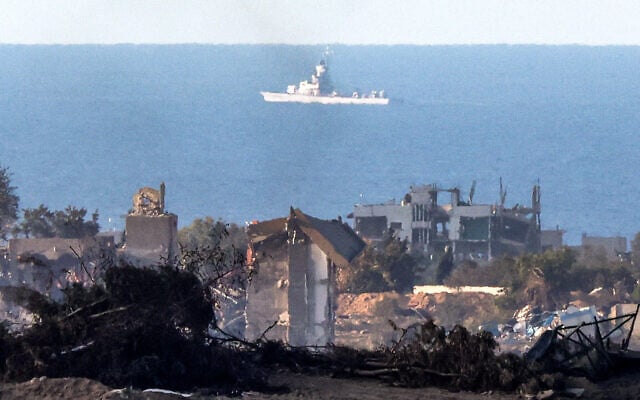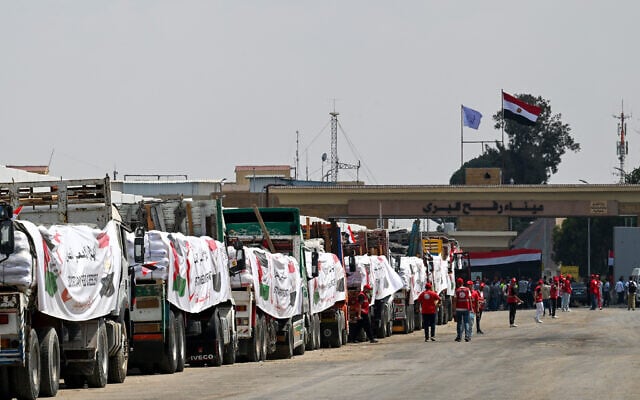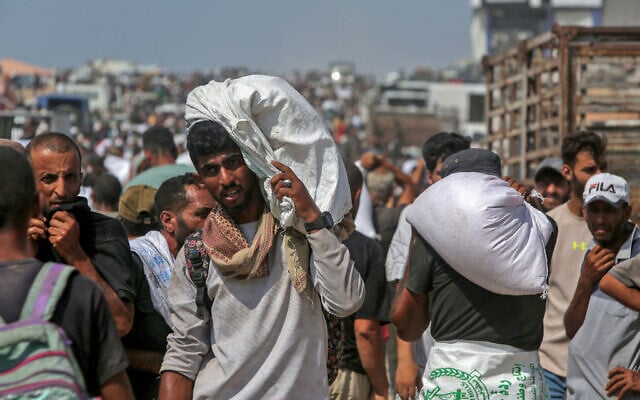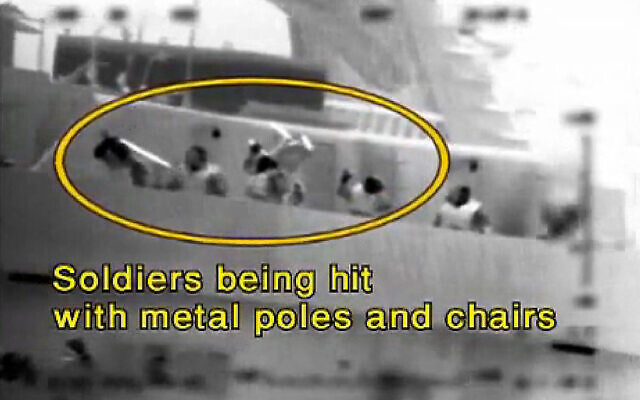

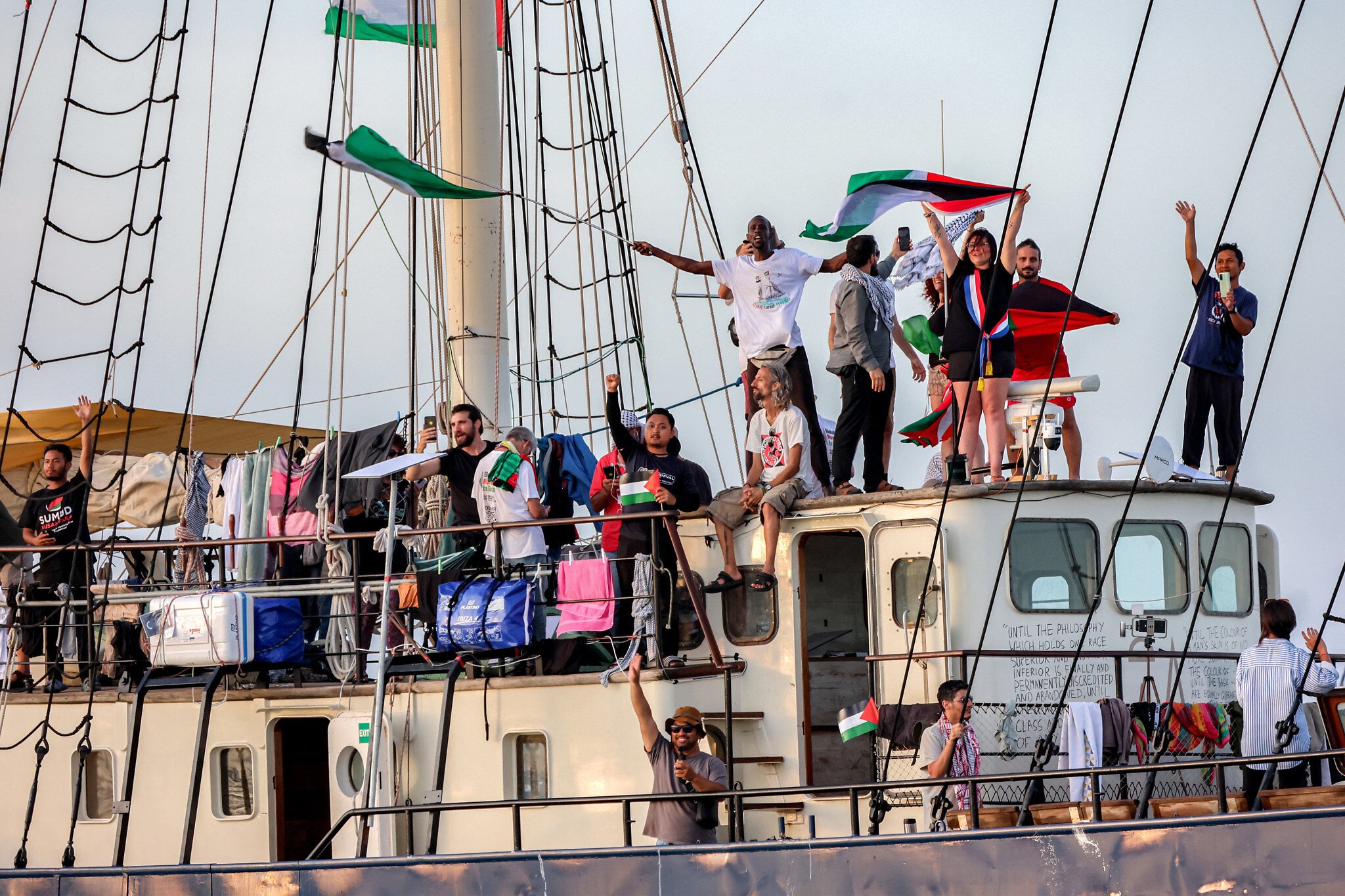
As the war with Hamas in Gaza drags on, and Israel presses ahead with its operation to conquer Gaza City, international groups have been ramping up their efforts to apply greater pressure against Israel on a variety of fronts.
One such effort is the “Global Sumud Flotilla,” in which some 35 small boats of different types with around 350 activists are sailing across the Mediterranean, intending to deliver aid directly to Gaza.
The flotilla, which the organizers say includes delegations from 45 different countries, is currently in the central Mediterranean region, north of Libya and west of Crete, and will take approximately another week to reach the coastal area off of Israel and Gaza.
The flotilla seeks to break Israel’s naval blockade of Gaza and unload aid in the war-torn territory to help the civilian population, while also drawing attention to what it claims is “genocide” being committed by Israel against the Palestinians in Gaza.
Flotilla organizers contend that Israel is violating various aspects of international law, rendering the blockade it has imposed illegal. This, they argue, provides legal justification for its efforts to breach the blockade and means that any effort by Israel to intercept the flotilla would be illegal.
But is Israel’s blockade really illegal, and if not, is it entitled to intercept the Global Sumud Flotilla?
Israel officially declared a naval blockade on Gaza in January 2009 amid Operation Cast Lead, as part of an effort to restrict the Hamas terror organization’s ability to smuggle weapons and war materiel into the strip.
Israel has enforced the blockade ever since, stopping two attempts to break it this year as well as several others in the years before the current war, the most famous of which was the 2010 Mavi Marmara incident, in which 10 Turkish activists were killed in a violent confrontation with Israeli naval commandos aboard a ship that aimed to break the blockade.
Dr. Eran Shamir-Borer, director of the Israel Democracy Institute’s Center for National Security and Democracy, points out that naval blockades are a very common military practice, and a very old one.
They are listed as a legal tool of war in the military manuals of many Western countries, and are permitted under the San Remo Manual on naval warfare, a widely accepted codification of the laws of naval warfare, as well as under the London Declaration of 1909.
There are criteria for the lawful imposition and maintenance of blockades as set out in the San Remo Manual, but Shamir-Borer, a former head of the International Law Department of the IDF’s Military Advocate General’s Corps, asserted that Israel has met those conditions.
One key clause is that blockades cannot be imposed with “the sole purpose of starving the civilian population.” If the blockaded territory has insufficient food, then the party imposing the blockade must enable the free passage of food and essential supplies.
Israel argues, however, that its facilitation of the passage of aid into Gaza during the current war through land crossings undermines the claim that it is deliberately trying to starve Gazans, and argues that the humanitarian crisis is a function of the realities of military conflict and Hamas’s diversion of large amounts of aid, among other problems.
Additionally, the San Remo Manual states that blockades are also prohibited if the damage they do to the civilian population of the blockaded territory is “excessive in relation to the concrete and direct military advantage” anticipated from the blockade.
But Israel contends that this limitation was incorrectly applied from other aspects of the laws of armed conflict, and is not observed by other states, and is therefore not part of international law applying to blockades.
According to a report by Reuters, the Global Sumud Flotilla is currently transporting around 250 tons of aid that it seeks to unload in Gaza to help alleviate the humanitarian situation there.
The flotilla is also an exercise in political messaging, with the organizers stating that “These boats don’t just carry aid; they carry a message: the siege must end.”
The organizers say that their efforts come against what they claim is a policy by to deliberately starve Gazan civilians, and that this alleged policy violates explicit prohibitions in the Geneva Conventions, as well as broader bans on the use of collective punishment.
This, they argue, makes the blockade illegal and justifies their efforts to try and breach it.
But the amount of aid being brought by the flotilla represents a tiny fraction of the amount of aid currently being delivered through Israel’s border crossings with Gaza every week.
In the last week alone, from September 14 to September 19, a total of 736 humanitarian aid trucks entered Gaza bearing 14,125 tons of aid, 86 percent of which was food.
And Israel’s COGAT, the agency that coordinates the delivery of humanitarian aid into and around Gaza, stated that it facilitated the collection and delivery of some 1,700 trucks worth of aid inside Gaza last week.
Although Israel did prohibit the entry of aid into Gaza for ten weeks between March 2 and May 18 this year, that ban is no longer in effect. The ban was also preceded by the delivery of some 448,000 tons of aid in the ceasefire period from January 19 to March 2, which experts have said could have sufficed the civilian population’s needs for as much as six months.
The large amount of aid that Israel helped bring into Gaza would appear to undermine the arguments that Israel is engaging in a deliberate policy of starvation against civilians in the territory, and by extension that the blockade is illegal, something which Shamir-Borer mentioned.
“Allegations that the blockade is intended to collectively punish or starve the civilian population in Gaza are baseless, and also make no sense given Israel’s policy to allow and facilitate entry of humanitarian aid into Gaza via land passages and the absence of necessary port infrastructure in Gaza to support maritime transportation,” he said.
Shamir-Borer also pointed out that a report issued by a panel of inquiry into the Mavi Marmara incident established by the UN Secretary General in September 2011 determined that Israel’s blockade on Gaza was legal and “a legitimate exercise of the right of self defense,” since it was designed to stop weapons smuggling by Hamas and other military activity.
The report also stated that it had “not been persuaded” that the naval blockade was disproportionate, given the threat it faced from Hamas.
A report commissioned by the UN Human Rights Council determined, however, that the blockade did disproportionate damage to Gaza’s civilian population and was therefore illegal, and that by extension, Israel’s interception of the Mavi Marmara and other boats in the flotilla had also been illegal.
Shamir-Borer argues that the rule of proportionality for blockades was simply “imported” by the San Remo Manual from targeting laws applicable to conducting attacks, and has not become part of state practice when imposing blockades, and is therefore not part of customary international law.
He pointed out that the US Naval War College’s recently published Newport Manual on the Law of Naval Warfare states specifically that proportionality is not a consideration for blockades, since blockades do not qualify as an attack.
Enforcing blockades by intercepting ships seeking to break them, as Israel has done and intends to do with the Global Sumud Flotilla, is clearly stipulated as a legal entitlement under international law in the relevant treaties.
The San Remo Manual states explicitly that a blockade may be enforced “by a combination of legitimate methods and means of warfare.”
And it further states that merchant vessels “believed on reasonable grounds to be breaching a blockade” may be captured, and that such vessels resisting capture can even be attacked after being warned.
Since it is the explicit aim of the Global Sumud Flotilla to breach Israel’s naval blockade, it would appear that Israel is within its rights to intercept it.
A key claim by activists seeking to break the naval blockade is that their vessels are sailing in international waters, arguing that this makes it illegal for Israel to intercept them.
But capturing ships that openly declare their intention to break the blockade can be done on the high seas, meaning outside of territorial waters, and is permitted under international law, Shamir-Borer said.
The San Remo Manual states that neutral vessels cannot be attacked unless they are believed to be breaching a blockade, which the flotilla intends to do, and that in such a situation neutral merchant vessels are subject to capture outside neutral waters.
“You don’t have to wait for a point in time when vessels breach the blockaded area,” Shamir-Borer stated.
“It is enough that they are attempting to breach the blockade. If they provide a statement that they intend to breach, that is enough, and it can be done on the high seas.”
Since the Global Sumud Flotilla declares that it is its intention to sail to Gaza and unload its cargo there, Israel is entitled to enforce its naval blockade, Shamir-Borer contended.


